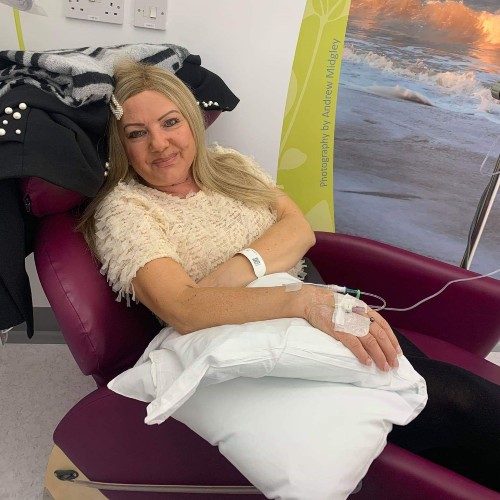Jargon Buster
Are you struggling through all the jargon?
When diagnosed or living with the effects of cancer and its treatment, the amount of information we have to take in can sometimes be challenging. Particularly when we have to understand new words and what they mean. Our Jargon Buster will help clear up some of these meanings for you.
- Benign
-
Benign means not cancerous. They do not invade into nearby tissue or spread to other parts of the body. They can be serious if they grow and put pressure on vital structures such as nerves and blood vessels.
- Biopsy
-
A biopsy is a small sample of tissue or cells taken from the body. These may be taken as a needle biopsy or as a swab.
- Brachytherapy
-
Brachytherapy (internal radiation therapy) is a type of radiation therapy used to treat cancer. A source of radiation is placed inside the patient to kill cancer cells and shrinks tumours. It uses a higher dose of radiation to treat a smaller area than external therapy.
- Chemotherapy
-
Chemotherapy uses systemic anti-cancer therapy (cytotoxic drugs) to destroy cancer cells. It can be given alone or with other treatments. The treatment of disease by the use of chemical substances, especially the treatment of cancer by cytotoxic and other drugs.
- Full Blood Count
-
A blood count is a blood test which measures the levels of the different types of blood cells in the blood. The three main types of blood cell are:
- red blood cells, which carry oxygen
- platelets, which help the blood to clot
- white blood cells, which fight and prevent infection.
- Immunotherapy
-
Immunotherapy is an anti cancer treatment based on harnessing our own immune system to fight cancer. It works by helping the immune system recognise and attack cancer cells.
- Intravenous (IV)
-
This means being given into a vein. A person may have fluids or drugs given into a vein via a cannula. Existing or taking place within, or administered into, a vein or veins.
- Lymphatic system
-
The lymphatic system helps to protect us from infection and disease. It is made up of fine tubes called lymphatic vessels that connect to groups of lymph nodes throughout the body. The network of vessels through which lymph drains from the tissues into the blood.
- Lymphoedema
-
Lymphoedema is the swelling of the soft tissue caused by a build up of lymph fluid. Different types of surgery that remove sections of the lymphatic system and some treatments can be a cause.
- Malignant
-
Malignant means cancerous. Malignant tumours may spread to different parts of the body. Tending to invade normal tissue or to recur after removal; cancerous. Contrasted with benign.
- Oncologist
-
A medical practitioner qualified to diagnose and treat cancerous tumours.
- Oncology
-
Oncology is the medical specialty that deals with cancer. The study and treatment of tumours.
- Palliative Care
-
Palliative care is the active holistic care and support of those with advanced progressive diseases, that are incurable, such as cancer. Palliative care is given to improve the quality of life, it’s an approach that addresses the person as a whole, not just the disease. It aims to improve quality of life for both patients and their families.
- Prognosis
-
A prognosis is what is likely to happen with someone’s disease in the future. The likely course of a medical condition. An opinion, based on medical experience, of the likely course of a medical condition.
- Radiotherapy
-
Radiotherapy uses high-energy x-rays to destroy cancer cells. Radiotherapy can be used to reduce the chance of the cancer coming back, cure cancer or to relieve symptoms and reduce tumour size.
- Syringe Driver
-
A small, portable pump that can be used to give a constant rate of medicines over a period of time. The medication is put into a syringe and put in the syringe drive that is connected to thin tube into the body. The tube is inserted using a thin needle which is secured with an adhesive dressing.
- Tumour
-
A tumour is a growth or lump. It may be benign (not cancer) or malignant (cancer).
A swelling of a part of the body, generally without inflammation, caused by an abnormal growth of tissue, whether benign or malignant.
- Wide Local Excision
-
A wide local excision involves surgical removal of a tumours and some normal tissue surrounding it, known as “clear margins.”
If you can’t see the answer to your question above, please contact us on 0800 092 7640.
Online support
Our Online Support Hub offers a full range of support virtually, ensuring you can still access our services from the comfort of your own home.
Ask the Nurse
Did you attend an appointment and have questions you didn’t want to ask, or not mention something that is bothering you?
FAQs
Browse our Frequently Asked Questions about the support we offer. If you can’t see the answer you’re looking for, just get in touch.
We’ve helped people like Louise
Following a routine mammogram screening, Louise was told that a lump was found in her breast, resulting in a breast cancer diagnosis in August 2019. This is her story…

Browse
We can help you work through the maze of cancer information.
Support
At our centres across the region, we offer support to anyone affected by cancer.
About us
We are a local, people-first charity providing outstanding cancer support.
Let’s keep in touch
Subscribe to our mailing list to receive news and updates from Big C.